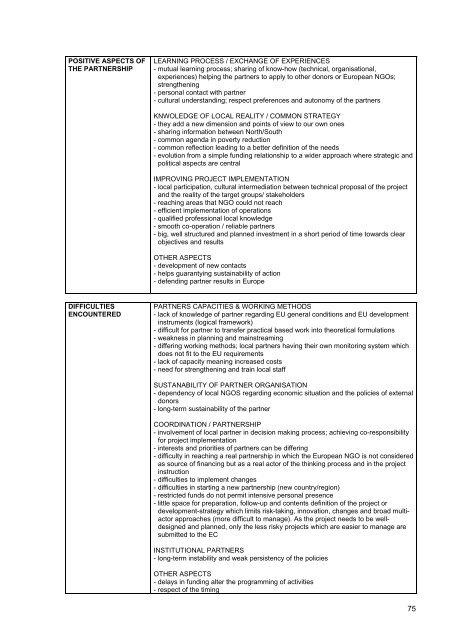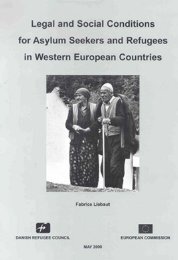INFORME DEL SEMINARIO REGIONAL
INFORME DEL SEMINARIO REGIONAL
INFORME DEL SEMINARIO REGIONAL
You also want an ePaper? Increase the reach of your titles
YUMPU automatically turns print PDFs into web optimized ePapers that Google loves.
POSITIVE ASPECTS OF<br />
THE PARTNERSHIP<br />
DIFFICULTIES<br />
ENCOUNTERED<br />
LEARNING PROCESS / EXCHANGE OF EXPERIENCES<br />
- mutual learning process; sharing of know-how (technical, organisational,<br />
experiences) helping the partners to apply to other donors or European NGOs;<br />
strengthening<br />
- personal contact with partner<br />
- cultural understanding; respect preferences and autonomy of the partners<br />
KNWOLEDGE OF LOCAL REALITY / COMMON STRATEGY<br />
- they add a new dimension and points of view to our own ones<br />
- sharing information between North/South<br />
- common agenda in poverty reduction<br />
- common reflection leading to a better definition of the needs<br />
- evolution from a simple funding relationship to a wider approach where strategic and<br />
political aspects are central<br />
IMPROVING PROJECT IMPLEMENTATION<br />
- local participation, cultural intermediation between technical proposal of the project<br />
and the reality of the target groups/ stakeholders<br />
- reaching areas that NGO could not reach<br />
- efficient implementation of operations<br />
- qualified professional local knowledge<br />
- smooth co-operation / reliable partners<br />
- big, well structured and planned investment in a short period of time towards clear<br />
objectives and results<br />
OTHER ASPECTS<br />
- development of new contacts<br />
- helps guarantying sustainability of action<br />
- defending partner results in Europe<br />
PARTNERS CAPACITIES & WORKING METHODS<br />
- lack of knowledge of partner regarding EU general conditions and EU development<br />
instruments (logical framework)<br />
- difficult for partner to transfer practical based work into theoretical formulations<br />
- weakness in planning and mainstreaming<br />
- differing working methods; local partners having their own monitoring system which<br />
does not fit to the EU requirements<br />
- lack of capacity meaning increased costs<br />
- need for strengthening and train local staff<br />
SUSTANABILITY OF PARTNER ORGANISATION<br />
- dependency of local NGOS regarding economic situation and the policies of external<br />
donors<br />
- long-term sustainability of the partner<br />
COORDINATION / PARTNERSHIP<br />
- involvement of local partner in decision making process; achieving co-responsibility<br />
for project implementation<br />
- interests and priorities of partners can be differing<br />
- difficulty in reaching a real partnership in which the European NGO is not considered<br />
as source of financing but as a real actor of the thinking process and in the project<br />
instruction<br />
- difficulties to implement changes<br />
- difficulties in starting a new partnership (new country/region)<br />
- restricted funds do not permit intensive personal presence<br />
- little space for preparation, follow-up and contents definition of the project or<br />
development-strategy which limits risk-taking, innovation, changes and broad multiactor<br />
approaches (more difficult to manage). As the project needs to be welldesigned<br />
and planned, only the less risky projects which are easier to manage are<br />
submitted to the EC<br />
INSTITUTIONAL PARTNERS<br />
- long-term instability and weak persistency of the policies<br />
OTHER ASPECTS<br />
- delays in funding alter the programming of activities<br />
- respect of the timing<br />
75
















